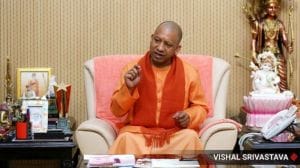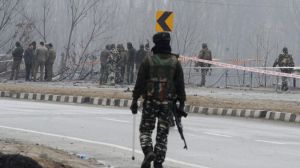Rebels next test is how to build a working state from nothing
Arab states are usually either republics or variations on the family-ruled monarchy,but Libya under Muammar Gaddafi was a Jamahirya.
Arab states are usually either republics or variations on the family-ruled monarchy,but Libya under Muammar Gaddafi was a Jamahirya.
The term his invention means a state of the masses,and was part of the fiction perpetuated by the maverick ruler intended to convince his long-suffering people that they were in control of their destiny,and he was merely a guide or guru showing them the way. The colonel presented himself as a political visionary who had devised a system of direct democracy under which the population ruled itself through citizen collectives. The slogan plastered on many public buildings in Libya went,Power,wealth and arms are in the hands of the people.
In reality,of course,the state of the masses was in the hands of only one man,the colonel,whose face looked down from huge billboards around the country and whose whims dictated Libyas course for 42 years. The leader even renamed the months of the year and changed the calendar to fit his fancy.
Easy as it is to laugh at his eccentricities,the reality is that as a new leadership emerges and his regime crumbles,tackling Colonel Gaddafis legacies offers a daunting path ahead.
Building human capacity and creating durable institutions to maintain the cohesion of the state and lead its economic and political development are likely to prove the biggest challenges facing Libyas new rulers once they have stabilised security.
Four decades under Col Gaddafis capricious and despotic rule have left Libya as a state with no institutions. There is no parliament,no political parties and no civil society. Education is poor,the bureaucracy is inept and oil money has undermined the work ethic,with foreign labour imported even as many Libyans held undemanding jobs in the state sector. (Foreign journalists based in Benghazi in the east after it fell to the rebels complained their hotel rooms were never cleaned; the Egyptians and other foreign workers who kept many establishments functioning had fled.)
The national transitional council,now the highest political authority in the country,has presented an ambitious blueprint intended to chart the way towards elected rule. This includes plans to elect a constituent assembly to write a new constitution and appoint a government within eight months. Parliamentary elections would take place in less than two years.
But the difficult part will be implementing that vision. The trouble is that we have never had institutions, says Hafed al-Ghwell,a Washington-based Libya analyst. We will not be reviving them but building them from scratch,and it could go either way.
The Arab world does not offer Libya models of democratic state-building that it can emulate. The Iraqi experience is incomplete and remains fraught with problems,while the oil states of the Gulf are monarchies held together by authoritarian family rule a model that cannot be replicated in a north African country that has just shaken off dictatorship and looks forward to a more accountable system.
As it grapples with Col Gaddafis difficult legacy,the new Libya might find it easier to succumb to the temptation to use its oil revenues to buy off the quiescence of the population. However,the model of the distributive state that relies on foreign labour,and gives generous handouts to its citizens but deprives them of political rights,is already fraying in other countries in the region.
Heba Saleh© 2011 The Financial Times Limited
Photos





- 01
- 02
- 03
- 04
- 05


























